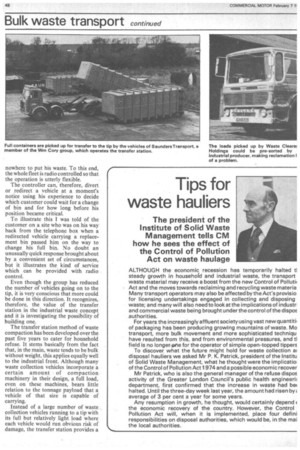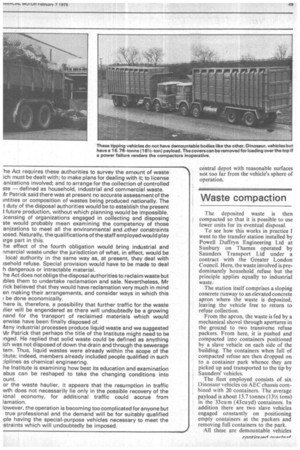Tips for waste hauliers
Page 50

Page 51

If you've noticed an error in this article please click here to report it so we can fix it.
The president of the Institute of Solid Waste Management tells CM how he sees the effect of the Control of Pollution Act on waste haulage
ALTHOUGH the economic., recession has temporarily halted ti steady growth in household and industrial waste, the transport waste material may receive a boost from the new Control of Pollutii Act and the moves towards reclaiming and recycling waste materia Many transport operators may also be affected by the Act's provisio for licensing undertakings engaged in collecting and disposing waste; and many will also need to look at the implications of industri and commercial waste being brought under the control of the dispos .authorities.
For years the increasingly affluent society using vast new quantitil of packaging has been producing growing mountains of waste. Mo transport, more bulk movement and more sophisticated techniqu have resulted from this, and from envirqnmental pressures, and ti field is no longer-one for the operator of simple open-topped tippers To discover what the future might hold for waste collection al disposal hauliers we asked Mr P. K. Patrick, president of the Institu of Solid Waste Management, what he thought were the implicatioi of the Control of Pollution Act I 974 and a possible economic recover Mr Patrick, who is also the general manager of the refuse dispos activity of the Greater London Council's public health engineerii department, first confirmed that the increase in waste had be halted. Until the three-day week last year, the amount had risen by i average of 3 per cent a year for some years.
Any resumption in growth, he thought, would certainly depend the economic recovery of the country. However, the Control Pollution Act will, when it is implemented, place four defini responsibilities on disposal authorities, which would be, in the mai the local authorities. he Act requires these authorities to survey the amount of waste ich must be dealt with; to make plans for dealing with it; to license anizations involved; and to arrange for the collection of controlled ste — defined as household, industrial and commercial waste. lir Patrick said there was at present no accurate assessment of the intities or composition of wastes being produced nationally. The t duty of the disposal authorities would be to establish the present 1 future production, without which planning would be impossible. icensing of organizations engaged in collecting and disposing ste would probably mean examining the competency of those anizations to meet all the environmental and .other constraints )osed. Naturally, the qualifications of the staff employed would play irge part in this.
he effect of the fourth obligation would bring industrial and nmercial waste under the jurisdiction of what, in effect, would be local authority in the same way as, at present, they deal with isehold refuse. Special provision would have to be made to deal h dangerous or intractable material.
he Act does not oblige the disposal authorities to reclaim waste but ibles them to undertake reclamation and sale. Nevertheless, Mr rick believed that they would have reclamation very much in mind en making their arrangements, and consider ways in which this I be done economically.
here is, therefore, a possibility that further traffic for the waste flier will be engendered as there will undoubtedly be a growing nand for the transport of reclaimed materials which would erwise have been finally disposed of.
lany industrial processes produce liquid waste and we suggested Vlr Patrick that perhaps the title of the Institute might need to be inged. He replied that solid waste could be defined as anything ich was not disposed of down the drain and through the sewerage tem. Thus, liquid wastes were already within the scope of the titute; indeed, members already included people qualified in such :iplines as chemical engineering.
he Institute is examining how best its education and examination abus can be reshaped to take the changing conditions into ount.
or the waste haulier, it appears that the resumption in traffic wth does not necessarily lie only in the possible recovery of the ional economy, for additional traffic could accrue from lamation.
lowever, the operation is becoming too complicated for anyone but true professional and the demand will be for suitably qualified iple having the special-purpose vehicles necessary to meet the straints which will undoubtedly be imposed.












































































































































